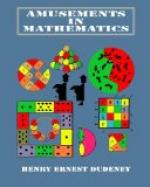3.—At A cattle market.
Three countrymen met at a cattle market. “Look here,” said Hodge to Jakes, “I’ll give you six of my pigs for one of your horses, and then you’ll have twice as many animals here as I’ve got.” “If that’s your way of doing business,” said Durrant to Hodge, “I’ll give you fourteen of my sheep for a horse, and then you’ll have three times as many animals as I.” “Well, I’ll go better than that,” said Jakes to Durrant; “I’ll give you four cows for a horse, and then you’ll have six times as many animals as I’ve got here.”
No doubt this was a very primitive way of bartering animals, but it is an interesting little puzzle to discover just how many animals Jakes, Hodge, and Durrant must have taken to the cattle market.
4.—The beanfeast puzzle.
A number of men went out together on a bean-feast. There were four parties invited—namely, 25 cobblers, 20 tailors, 18 hatters, and 12 glovers. They spent altogether L6, 13s. It was found that five cobblers spent as much as four tailors; that twelve tailors spent as much as nine hatters; and that six hatters spent as much as eight glovers. The puzzle is to find out how much each of the four parties spent.
5.—A queer coincidence.
Seven men, whose names were Adams, Baker, Carter, Dobson, Edwards, Francis, and Gudgeon, were recently engaged in play. The name of the particular game is of no consequence. They had agreed that whenever a player won a game he should double the money of each of the other players—that is, he was to give the players just as much money as they had already in their pockets. They played seven games, and, strange to say, each won a game in turn, in the order in which their names are given. But a more curious coincidence is this—that when they had finished play each of the seven men had exactly the same amount—two shillings and eightpence—in his pocket. The puzzle is to find out how much money each man had with him before he sat down to play.
6.—A charitable bequest.
A man left instructions to his executors to distribute once a year exactly fifty-five shillings among the poor of his parish; but they were only to continue the gift so long as they could make it in different ways, always giving eighteenpence each to a number of women and half a crown each to men. During how many years could the charity be administered? Of course, by “different ways” is meant a different number of men and women every time.
7.—The widow’s legacy.
A gentleman who recently died left the sum of L8,000 to be divided among his widow, five sons, and four daughters. He directed that every son should receive three times as much as a daughter, and that every daughter should have twice as much as their mother. What was the widow’s share?
8.—Indiscriminate charity.




